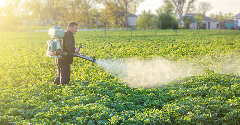News
PAN calls for ban after ‘forever chemicals’ found in UK food
26 Apr 2024Campaign group Pesticide Action Network (PAN) found PFAS pesticides, or ‘forever chemicals’, in over half of the samples of British produce it tested – but the UK government says strict limits are in place.
Pesticide Action Network (PAN) UK, a charity advocating for safe and sustainable alternatives to hazardous pesticides, identified polyfluoroalkyl substances (PFAS) pesticides in many everyday UK food items. With concerns for human health as a result of the new research, PAN is urging the UK government to stop the use of 25 pesticides in food production.

The charity analysed the latest results from the UK government’s residue testing programme, published in The Expert Committee on Pesticide Residues in Food (PRiF) Annual Report 2022. PAN identified 10 different PFAS pesticides, known as ‘forever chemicals’ in spices and fruits and vegetables. The 10 pesticides found comprise five types of insecticide and five kinds of pesticide.
Strawberries were the biggest carriers of PFAS pesticides, PAN’s research found, with 95% of the 120 samples tested by the UK government in 2022. Grapes, cherries, spinach, and tomatoes were also among the worst offenders, with 61% (109), 56% (121), 42% (96) and 38% (96) of the samples found to contain PFAS pesticides.
UK government argues within legal limits
However, the Department for Environment, Food and Rural Affairs (Defra), which published the PRiF report, indicates that its 2022 results show that nearly all (over 98%) of the food samples tested complied with legal limits for pesticides in that food, otherwise known as Maximum Residue Levels (MRLs). Under 2% of samples contain residues over legal maximum residue levels, Defra said.
“We set strict limits on the pesticide residue levels in both food for consumers and feed for animals,” a Defra spokesperson told Ingredients Network. “These limits are set to protect public health and are set below the level considered safe for people to eat as well as applying to both food produced in the UK and those imported from other countries,” the spokesperson added.
Food samples are tested for various pesticides, including PFAS chemicals, each year. While samples with residues over the legal MRLs are assessed, Defra said this only amounts to a small minority of these samples. Where necessary, the UK body, the Food Standards Agency (FSA), may take further action. Furthermore, in these instances, Defra said that it rarely finds any likely risk to the health of people who have eaten the associated food.
Worrying questions over health impact
PFAS refer to a family of approximately 12,000 chemicals. They are typically present in household products, such as non-stick pans, and some pesticides contain PFAS that can make their way into human bodies via diet.
They have been branded forever chemicals due to their ability to remain in the environment and gather in the blood, bones and tissue of living organisms, including humans, a 2017 research study indicated. While PAN said there is evidence to suggest these ‘forever chemicals’ are already present in most people’s blood, limited research exists in the UK exploring how they are linked to health problems. “A situation often used by the government and chemicals industry to delay action,” PAN said in its release.
Concerns are high as peer-reviewed studies carried out in other countries have drawn an association with PFAS exposure to various serious health problems, including a raised risk of cancer and reduction in fertility and the immune system’s ability to fight infections, a 2023 scientific article in The Lancet, suggested.
“Given the growing body of evidence linking PFAS to serious diseases such as cancer, it is deeply worrying that UK consumers are being left with no choice but to ingest these chemicals, some of which may remain in their bodies long into the future,” said Nick Mole, policy officer at PAN UK.
The campaigners express worries over the risk of childhood exposure to PFAS pesticides as they have been connected in a 2017 study to behavioural changes and developmental effects or delays in children, such as low birth weight and accelerated puberty.
“With some plastic food packaging also contaminated with PFAS, and PFAS present in UK drinking water and soil, we urgently need to better understand the health risks associated with ingesting these ‘forever chemicals’ and do everything we can to exclude them from the food chain,” added Mole.
In line with Defra’s 25-Year Environment Plan, the UK government department says its forthcoming National Action Plan on the Sustainable Use of Pesticides (NAP) will seek to support pesticide users in maximising non-chemical control approaches. “The NAP will be published in due course,” Defra’s spokesperson said.
Achieving a PFAS-free economy
In the UK, there are 25 PFAS pesticides currently in use, six of which are classified as ‘Highly Hazardous’. Farmers are typically unaware they are spraying ‘forever chemicals’ on their crops because labelling on packaging lacks information indicating as such.
Furthermore, the Environment Agency does not actively sample rivers for any of these 25 PFAS pesticides. Therefore, the UK does not know how much of these chemicals travel from agricultural fields to contaminate rivers and other water sources.
“PFAS pesticides are absolutely unnecessary for growing food and are an easily avoidable source of PFAS pollution. Getting rid of them would be a massive win for consumers, farmers and the environment,” Mole added.
PAN UK is calling on the UK government to urgently ban these 25 PFAS pesticides. It also urges for an increase in support for farmers to help them end their reliance on chemicals and adopt safer and more sustainable alternatives. The organisation is also behind health and environment non-government organisations (NGOs) calling for the UK to work towards achieving a PFAS-free economy by 2035.
In April 2023, Defra saw the arrival of the Health and Safety Executive’s publication of the PFAS Regulatory Management Options Analysis (RMOA). Defra has accepted RMOA’s recommendations, it says, which include work under UK REACH to reduce PFAS emissions by considering restrictions.
Related news

US legislative push to ban 7 food additives in schools
17 Apr 2024
Proposed legislation would prohibit the use of seven additives – six artificial colours and titanium dioxide – in food and drink served in US state schools.
Read more
Portugal officially adopts NutriScore
10 Apr 2024
Portugal has adopted the NutriScore as its official – but voluntary – front-of-pack nutrition label to promote healthy eating, with researchers calling this “a great victory for science and public health”.
Read more
Danish Crown’s ‘climate-controlled’ claim misleading, court finds
20 Mar 2024
Leading EU pork producer Danish Crown has been found guilty of greenwashing by misleading consumers with marketing claims about its “climate-controlled” pork and “climate-friendly” production.
Read more
Ultra-processed food intake in South Africa at concerning levels, study suggests
19 Mar 2024
As South Africa considers introducing front-of-pack warning labels and strict marketing limits for unhealthy foods, research has found that low-income South Africans get around half of their calories from ultra-processed foods (UPFs) – “a cause for con...
Read more
Brazilian manufacturers must comply with warning label regulation, says court
7 Mar 2024
The Federal Court of São Paulo has ruled that Brazilian manufacturers must comply with front-of-pack labelling regulation that requires unhealthy products to feature warning labels, scrapping a last-minute one-year extension.
Read more
US pet food regulations unravel the mysteries of product labelling
4 Mar 2024
New regulations governing the labelling of pet foods were approved by AAFCO members last July, providing the first major update to pet food regulations in 40 years. The move was a response to pet owners asking for clarity on labels that left many confu...
Read more
Pesticide residues in conventional baby food: A boost for organic?
29 Feb 2024
Nearly four in 10 (38%) of conventional US baby food products contain pesticide residues, according to research that also found that the organic samples were pesticide-free. Could this be an opportunity for organic or ‘pesticide-free’ produce?
Read more
Singapore's Islamic council: Cultivated meat can be halal
16 Feb 2024
The Islamic Religious Council of Singapore (MUIS) has said that cultivated meat consumption is permissible as halal under certain conditions, and where a more “rigorous” set of requirements are needed to ensure consumer assurance.
Read more
‘Not for EU’ label signals confusion and extra costs
6 Feb 2024
With affordability, variety, and choice paramount in today’s uncertain landscape, concerns exist around the UK’s “Not for EU” label.
Read more
Plant-based and processed: Avoiding the next big health debate
2 Feb 2024
Calls for clarity around ultra-processed food (UPFs) and ongoing debates on potential classification may bring the health credentials of plant-based food under the spotlight, which is why education is so necessary.
Read more